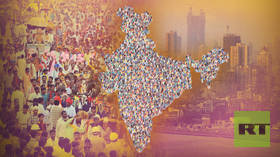‘Uterus politics’: Who wants the world’s most populous country to have even more babies?
The leaders of two southern Indian states have called on people to have more children – warning that population control will hurt states economically and politically
At 1.455 billion, India is the world’s most populous country. Yet the leaders of two important and affluent states, MK Stalin of Tamil Nadu and N Chandrababu Naidu of Andhra Pradesh, both in the south, have publicly called on their people to have more babies.
On the face of it, these appeals seem incongruous – especially when the rest of the country’s attention is focused on local elections in the western state of Maharashtra, which is also India’s wealthiest state – but they are subtle political urgings.
Stalin, while presiding over a mass wedding ceremony organized by his state government, quoted a Tamil blessing for prosperity used to bless newlywed couples, and called for a rethink on population control measures. He hinted that more children could help their state maintain its representation in Parliament’s Lok Sabha (lower house).
”The blessing mentions 16 types of wealth,” he said. “Though 16 does not mean children, the current situation makes us rethink our population control measures and raises the question, why can’t we have 16 children, which will help us to retain our representation in the Lok Sabha?”
It was on the heels of a similar statement by Naidu. “We are thinking of providing incentives to families with more children, encouraging couples to have more children,” he said at an event organized in Amaravati to restart construction work in his dream capital.
These statements sparked a North vs South debate and the “penalties” that southern states face for having implemented effective population control, be it in fund allocation from the federal government or in delimitation.
North-South Divide
South Indian politicians and experts argue that the region’s adherence to population policies has led to disadvantages in fund allocations and in future parliamentary representation. At a conclave in Kerala’s capital Thiruvananthapuram, finance ministers from four southern states voiced concerns over the low share they received from central taxes.
The Finance Commission, set up to determine financial relations between the central government and the state governments, has a funding formula that gives heavier weight depending on population size, affecting southern states with smaller populations, who receive less relative to their economic contributions.
The formula determines the states’ share in the divisible pool of taxes based on three factors: the state’s needs, which include population, area, forest, and ecology; Equity (per capita income difference between the state and the state with the highest per capita); and performance (own tax revenue and lower fertility rate).
The commission assigned different weights to each category: 40%, 45% and 15%. This formula meant that the poorer, more populous northern Indian states of Uttar Pradesh and Bihar got 17.9% and 10%, respectively, thanks to the previous commission, whereas in the south, Karnataka, Kerala, and Tamil Nadu got 3.65%, 1.93% and 4.08% respectively.
The weightage to populations is based on the 2011 census. It is a decadal census and one was supposed to happen by 2021. After four years of delay, the census will reportedly take place in 2025 (and the parliamentary delimitation for redistribution and addition of new seats will happen in 2028, in time for the 2029 Lok Sabha election).
Southern states have seen a decline in their share of the divisible pool over the years. Between the 10th (1995-2000) and 15th Finance Commissions (2021-2026), the shares of Andhra Pradesh, Tamil Nadu, Kerala, and Karnataka went down approximately 1.6% to 2.1% each.
These states have raised concerns regarding the per capita returns, which show a sharp variation between states and their contributions. For every one rupee contributed by Tamil Nadu to the Central government, it gets back 0.29 rupees. Karnataka gets back 0.15 rupee, Telangana, Andhra Pradesh, and Kerala get 0.43 rupee, 0.49 rupee, and 0.57 rupee respectively.
On the other hand, UP receives 2.73 rupees and Bihar 7.06 rupees, thanks to their larger populations. In absolute numbers, UP is reported to receive around 1.83 lakh crore rupees ($21.75 billion) from central taxes in 2024 financial year (from 1 April 2024 to 31 March 2025), which is significantly higher than what any of the southern states receive per capita.
Ageing Population in the South
Southern states are also experiencing a faster ageing of their populations. The India Ageing Report 2023 indicates that Kerala, Tamil Nadu, and Andhra Pradesh will see significant increases in their elderly populations by 2036, posing new financial challenges for welfare and healthcare programs. This shift raises dependency ratios (total dependents per working population), further complicating the funding and development needs for these states.
But not everyone is convinced by the Southern leaders’ calls for replenishing the population.
“I’d call this uterus politics,” an eminent political analyst in Andhra Pradesh said while demanding anonymity. “How can they ask women to give birth to more children? Do they have any idea of what it is for a woman to give birth to a child? And nowadays for a family to bring up a child, give proper food, decent clothing, healthcare and a proper education? What happens to the woman’s body? To her health? To her career and anything she wishes to pursue? Just because these guys want more people in their states, who are they to decide what a woman should do with her body?”
“The whole discussion about increasing the population for political gain disrespects a woman’s body,” AS Paneer Selvam, a former political Editor, said. “Policymakers should come up with different parameters for delimitation and devolution of funds. Suggestions like having more children are insensitive towards women’s health and their bodies.”
Delimitation and the socio-political impact
Delimitation is the process of fixing the number of seats and boundaries of territorial constituencies in each state for the Lok Sabha and legislative assemblies. The Indian Constitution mandates proportional representation as the basis for the allocation of parliamentary seats.
The constitution mandates that each state be granted seats commensurate with its population and distribute those seats among constituencies of approximately uniform size. In order to divide the seats proportionally, the Constitution also prescribes the reallocation of seats in the Lok Sabha and the state assemblies after every census based on updated population figures.
But the Constitution was amended in 1976 during the Emergency to freeze the number and boundary of constituencies in Lok Sabha and state legislatures as per the population figures of the 1971 census. This freeze was initially for a period of 25 years ending in 2001, ostensibly due to the disparity in the implementation of family planning efforts by different states. The government wanted to avoid penalizing states that have successfully limited population growth.
In 2001, when it was time to readjust the size of constituencies as per the Constitution, the A B Vajpayee government, fearing backlash from the coalition partners, again through a Constitutional amendment postponed the delimitation exercise till 2026.
As the 2021 census was postponed due to the Covid-19 pandemic and is now scheduled to begin in 2025, delimitation is a matter of concern for the southern states given the varied population growth across India. The debate around increasing parliamentary seats restarted with the inauguration of a new parliament building with expanded seating for 888 Lok Sabha members.
Arguments supporting reconstituting geographical boundaries of constituencies have gained ground from the northern states, who argue that the representation in the parliament is disproportionate to the states’ population. For instance, in Bihar, one member of Parliament (MP) represents approximately 3.1 million citizens, while in Kerala, it is 1.75 million.
But as far as the southern states are concerned, they are getting penalized for implementing effective population control measures. If delimitation is to be implemented in the coming years based on the new census, the southern states will lose a considerable number of seats. Tamil Nadu will lose eight seats, reducing its current 39 MPs to 31; Kerala will lose eight seats; Andhra and Telangana put together will lose 8; and Karnataka will lose two seats.
On the other hand, the Hindi belt (also known as the Hindi Heartland – predominantly Hindi speaking states in northern, central and parts of eastern and western India, including Bihar, Chhattisgarh, Haryana, Uttar Pradesh [UP] and others) will have an overall advantage because of the abundant increase in population and stand to gain more seats and, thereby, more representation in Parliament. UP, Bihar, and Rajasthan will gain 11, 10, and six seats, respectively.
Experts feel this move will undermine the federal structure and will lead to dissatisfaction of the states that will lose seats because of effective implementation of population control measures.
Also, political analysts believe this will prove advantageous to the ruling BJP in New Delhi, which has a considerable majority in the northern states like UP.
Expert Insights: A Need for Equity and Reform
“This is a social issue,” Dr J Jayaranjan, vice president of the State Development Policy Council of Tamil Nadu, said. “Devolution is based on the distance between national per capita income and the states, the common denominator being population and poverty. But it’s working to the disadvantage of southern states—it’s like penalizing them for population control.”
To the argument put forward by the centre that is about equity, Dr Jayaranjan said that on the one hand we can’t talk about reservations and on the other hand they go against equity. “There should be a mechanism to address the problem,” he said.
“The states that receive more support should come up with a plan to control population,” he said. “But what happens is different: there is no mechanism, and they keep on enjoying benefits. Equity is meant to help poor states rise to the level of developed states, which is not happening, and on top of that the concerns raised by the South are not addressed.”
He lamented the cess levied by the central government as a burden on the states. “Both vertical devolution and horizontal distribution are working unfavourably for states like Tamil Nadu” Dr Jayaranjan told RT. “TN being the most urbanized among larger states needs more funds for development, but the central government is not giving us incentives. It is getting our money without giving us devolution.”
Paneer Selvam puts it bluntly: “A delimitation based on the upcoming census will be beneficial to the ruling BJP [Bharatiya Janata Party]. Most Hindi-speaking states support the BJP and if the number of seats in Parliament increase, BJP will not need the South or the East for any political decision.”
It’s the same case with delimitation too. Representation in the Lok Sabha based on population is to ensure equality – Tamil Nadu has one representative per 700,000 people, whereas UP has one representative per 2.5 million. Since 1971 there has been a freeze on population data for the purpose of delimitation, but no alternate mechanism has been created to address the issues facing developed states.
The disparities in fund allocations between southern and northern states and the delimitation exercise in the near future highlight significant concerns regarding equity and representation in India’s federal structure. Experts said reforming the financial devolution framework should be given importance in the Finance Commission’s recommendations, which might lead to better solutions. And as far as delimitation is concerned, a formula to accommodate equity and social justice should be the key to addressing the issues raised by the concerned stakeholders.








Comments are closed.